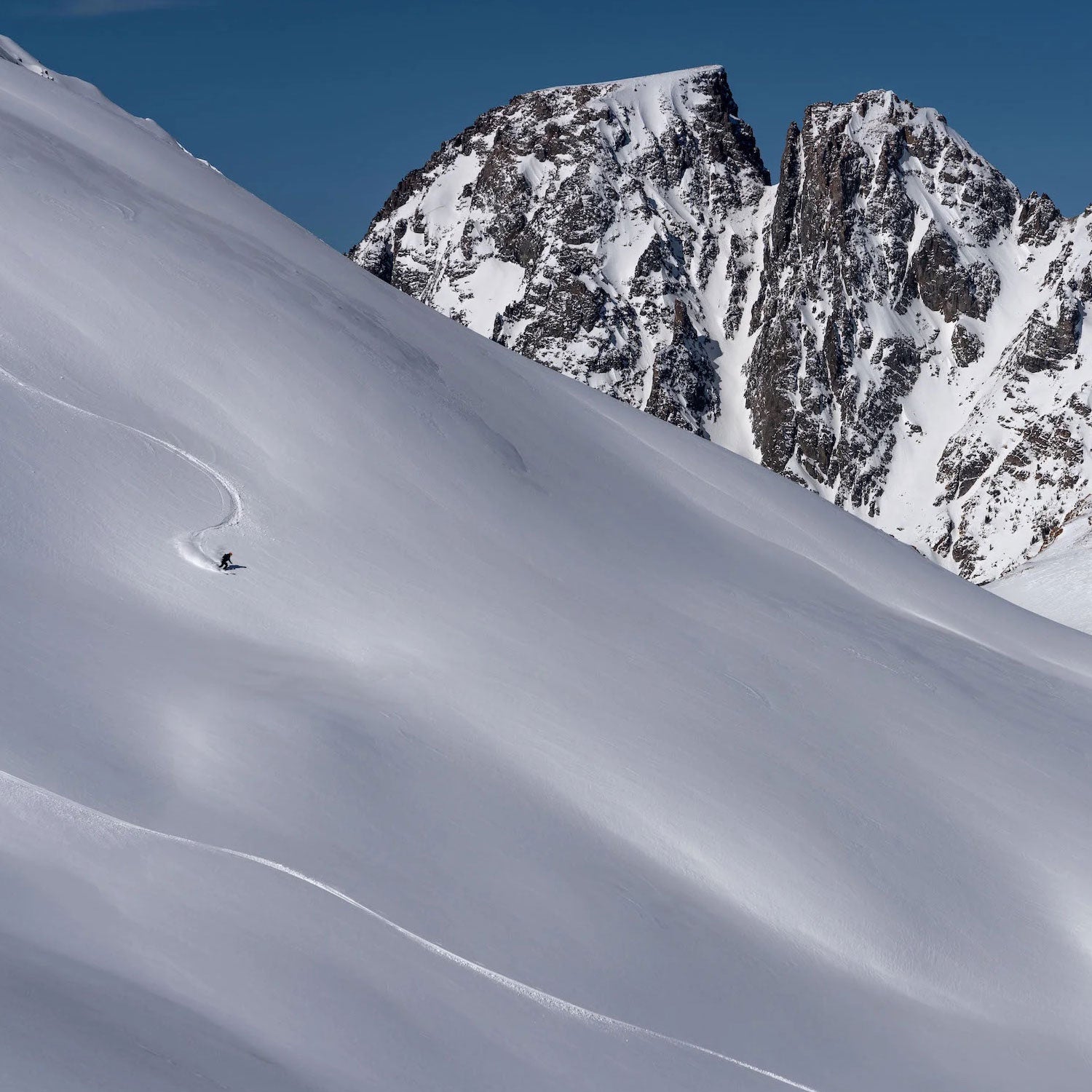Toward the end of the 2020-’21 season, as the ice was just beginning to break up on the first round of the pandemic and the sketchiest snowpack in history west of the Rockies turned to corn, I had the opportunity to travel to Montana to do a little exploration of my mental health via backcountry ski tour.
Don’t get me wrong: I was doing fine, all things considered. Sure, the lodgepoles and the whitebarks were dying or already dead; seas were rising; winter was disappearing. Humans were proving irredeemably mean and shortsighted. My own 16-year-old son, even though he’s a great skier, had made clear he preferred Fortnite over powder. Garbage-eating ravens were taking over the world and all the grinding hours I spent every work day video chatting in defense of the environment were making not a damn bit of difference.
But hey, I was skiing almost everyday, sneaking it in whenever I could. Whether it was early morning hot laps on Mammoth Mountain corduroy before the crowds set in, low-angle backcountry wiggles at sunset, or just an afternoon walk in the woods with the dog—as long as I was on skis, even on crappy old snow, there was balance and well-being. Call it happiness. The trick, of course, was how to hang on to that feeling when I wasn’t on skis.
When the invitation came over the wire to join Iraq War veteran and outdoor wellness pioneer Stacy Bare in Cooke City, Mont., for what he was calling an “intentional adventure,” I didn’t hesitate. His outfit, s, aims to “lower stress, increase joy, and deepen connection” through backcountry skiing. Whether all that would help me address my own underlying malaise in any significant or enduring way, I had my doubts. But I’d seen the Beartooths in summertime and had always wanted to get up there on skis. I was only half vaccinated and I hadn’t been on an airplane in a year, but I canceled a week’s worth of Zoom meetings anyway and booked a ticket to Bozeman.
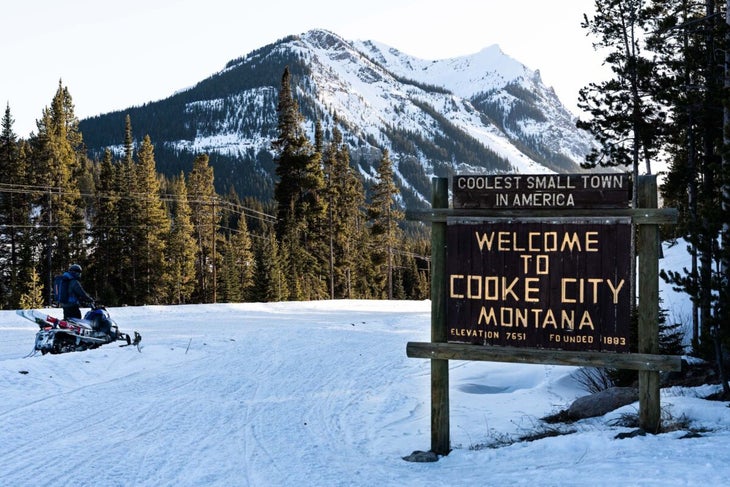
1. Intention
Then it started to get real. Before I headed out, I was supposed to schedule a one-on-one “intention setting” session with the operation’s Chief Health Officer, Koorosh Rassekh. Looking at the profiles of some of the other participants, I wasn’t sure my issues measured up. There was a pro-kiteboarder and entrepreneur from Hood River whose mother had died when she was 9. Her father had been in federal prison for eight years for growing and selling weed; he was finally released on her 30th birthday. There was a competitive freeskier and mountain biker from Jackson Hole who was dealing with physical injury, crippling fear, and intense professional pressure. And a money manager from Omaha who’d nearly died from heatstroke during the Boston marathon. He couldn’t shake the conviction that he was going to go out young—sooner rather than later—like his grandfather had.
And of course there was Bare himself, a towering, jovial, big-hearted man-child who has defused land mines, lost friends to snipers’ bullets and IEDs, and narrowly escaped being blown up on the streets of Baghdad. He had to literally climb his way out of the depths of depression and drug addiction. These people are heroes, with real trauma to work through. What did I have to complain about?
“Oh you’ve got plenty you can work on,” my wife assured me.
I shared this with Rassekh at the start of our first video meeting. He wore a knit-wool skull cap, Atticus Finch glasses, and a thick, salt-and-pepper tangle of a pirate’s beard. On the wall behind him was a big blue painting with white letters that read On To The Next Mistake. He laughed heartily. Apparently, his wife was also skilled at sniffing out the fine line between his true self, such as it was, and his self-deception.
“Ask my wife,” he said. “She’ll set you straight about the folly of what it means to be me.”
Setting intentions was not a particularly new concept to me. Most mornings I wake up intending to knock out a thing or two on my ever-growing list of shit that needs to get done. And rarely, if ever, do I head out into the backcountry without a fairly specific notion of where I intend to go and what I intend to climb and ski. Even if that intention changes along the way based on conditions or whatever else—where I might’ve set out to climb this peak or ski that line, now I intend just to get home and have a cold beer and a hot shower—the intention is there. But setting an emotional intention for a ski trip? That was new.
For starters, I resolved to be more mindful and aware of what I was feeling at any given moment and where that feeling was coming from. The evening before I talked to Rassekh, I’d gone out to rip a few end-of-the-day wellness laps on old Chair 22, in what I think of as my backyard on Mammoth Mountain. I’d stopped by my son Jasper’s room on the way out. As usual, he was one with his bean bag, his laptop, and his iPhone.
“Join me?” I asked.
He didn’t even look up. “I’ll head out in a little bit,” he said.
It couldn’t have been a more magical session. The snow was soft, edgeable chalk spread with a fresh coat of wind buff. The air was still and crystalline. The world was bathed in sidelong, liquid light emanating from over the Ritter Range. And it was all mine for the last hour before the lift closed. Where had everyone gone? The playlist in my ears paired perfectly with the contours of the terrain as I sliced and soared. I felt alive, fit, free, masterful, focused, sublime.
When I got home, I found Jasper still in the same position on his bean bag. I felt—I was trying to pay attention to the feeling—anger, disappointment, guilt, sadness. How had I failed so completely as a father? I couldn’t help but say something mean and sarcastic. And then I felt shitty. I went back and apologized. I vowed to myself that I would let it go. I would let him be the person he wants to be, the person he is. The kid is awesome, after all: smart, funny, confident, compassionate, irreverent. Why should it matter that he find his passion—if that’s what it is—in something other than mountains and skiing?
“Good luck with that,” said Rassekh with deep empathy and compassion. This was not new territory for him as a father, a fellow lover of skiing, and a longtime family therapist. On the one hand, he explained, there were limits I would have to set as a parent. I had to do what I could to help my son make good decisions, to help keep him from ending up “face down in the gutter,” as Rassekh put it. Maybe, in the whole big grab bag of dissociative experiences available to today’s teenager for the quelling of pain and boredom, binge-scrolling through pop culture memes and latter-day SNL skits was hardly the worst.
On the other hand, this was about me and my own twisted inner landscape. So, he suggested, maybe the intention could be framed as follows: “How do I notice the difference between my activation and what my kid needs?” Okay, I thought. I might have to noodle on that one for a while. Activation? And then the hour was up.
To make sure my external kit—the gear, the body, the non-emotional stuff—was dialed for some big skiing in the Beartooths, I put in a long day on Mount Wood with a friend, climbing 5,400 vertical feet from the shore of Grant Lake. The last 1,000 feet up the main gully, my ski partner and I kicked in one step after another in progressively deteriorating mashed potatoes, hauling ourselves upward at a steady pace in hopes of beating what was likely to be a massive wet slide. I became mindful of the burning sensation in my legs and lungs. I took the opportunity to further hone my intention into something simpler and perhaps considerably less attainable: I would aim in all instances to remain aloof from pain and suffering.
I could hear Rassekh laughing inside my head: “Good luck with that.”
The next day, the day before I was to fly to Montana, in the midst of some fun spring afternoon resort cruising with my wife, in an instantaneous lapse away from the present—I have no idea where my mind went—I caught an edge and broke my leg.
I held onto my intention. There was pain—plenty of it—but no suffering. I waved and smiled to the gawkers on the lift, sketched my way down the mountain on one leg, hobbled into the ER. It was a lucky break, as it were, a clean snap of the fibula. There was nothing to be done: no cast, no boot, just four to six weeks of putting my left leg down very, very carefully. There would be no skiing in the Beartooths for me that season.
Still, the next morning, given that this was to be an inner journey anyway, and my right leg was in fine shape, I drove myself to Reno, donned a KN95 mask, availed myself of a wheelchair ride through security, and flew to Montana.
2. Exploration
I hitched a ride up to Madison and out across the northern edge of Yellowstone National Park in a rental car with Sensi Graves, the kiteboarder. Winter was starting to pull back from the sage steppes of the Lamar Valley. The bison were moving. Up toward the Absarokas, to the northeast, a late spring storm was gathering. It seemed likely there’d be a fresh dusting of powder in the morning. For those who could ski. I felt the old anticipation in my gut, even though I knew I’d be missing out.
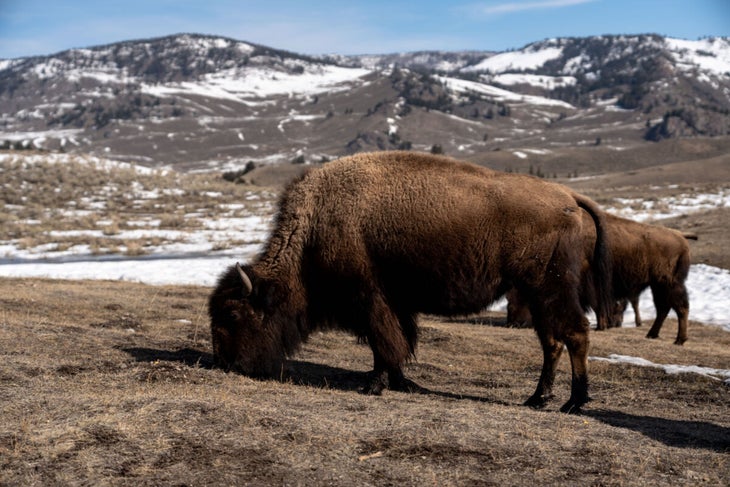
Clear-eyed, eternally smiling and sparkling with energy, Graves—named Sensi for Sinsemilla, or seedless cannabis, by her father—talked about the current transitions she was working through: moving away from competition; deciding whether she wanted to get out—or double down—of the sustainable swimwear business she’d been building for years; and either way, actually marry her longtime fiancé. She’d just come from visiting her grandfather in Orange County. He’d been her primary caretaker when she was younger. Now he was dying.
Graves had been on the fence about coming on this trip. She’d never done “any backcountry anything,” as she put it. She learned to ski when she was two, and started snowboarding when she was 13. “I don’t want to be the weakest link in the group,” she explained. Plus, she should really be working. “And then I was like ‘wait, that’s ridiculous.’ I want to say yes to adventure. That’s what I’ve built my life on.” So she borrowed a splitboard from a friend and learned how to take it apart and put it back together. She also borrowed avy gear and immediately began fretting that she wouldn’t be able to use it properly.
She talked about the pressure she felt, with her dad, with her business, to be more than just a human being, to be instead what she called a “human doing.” She talked about her intention to slow down, to be present and aware, to feel like she was “enough.” For my part I talked about the apparent futility of environmental activism, how no matter what we did—all the action alerts and comment letters and calls to members of Congress—it didn’t seem to make a damn bit of difference.
While we chatted, she drove like she was late to an important business meeting, pressing right up onto the tailgate of the car in front of us as it slowed down to appreciate yet another roadside wildlife tableau. I put my feet on the dashboard, trying to focus on the wide-open landscape. Since I couldn’t ski powder, I thought, maybe instead I’d spot a wolf or a grizzly. We later learned that we’d blown right past a pack of wolves on a kill beside the road. Neither of us noticed.
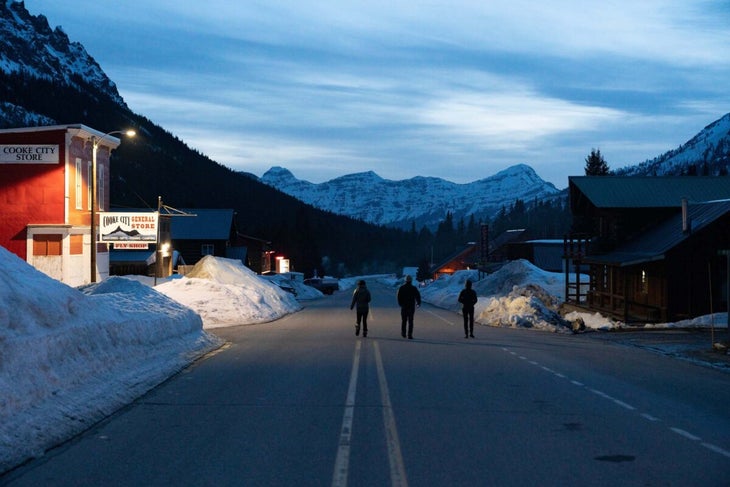
Cooke City, population 80-or-so depending on the season, is one of the most remote hamlets in the Lower 48, especially in winter. Just over the Montana line from the northeast entrance to the park, corralled within towering ramparts of rock, ice, and hanging snowfields, the ramshackle collection of old shacks and retired vehicles that comprise the town clings to either side of the road, half buried in snow drifts. There’s no cell service, and only very limited internet. The main street—the Beartooth Highway—dead-ends at the east end of town in a berm of snow. Even with a broken leg, a person can hobble the five or so blocks from one end of town to the other in a handful of minutes. Most people, it seems, commute up and back on snowmobiles.
Ordinarily, a wintertime Happy Grizzly �����ԹϺ��� would involve packing into a backcountry hut with the whole group, quickly bonding over intimate sleep sounds and foot smells. This time, due to lingering pandemic realities, we spent the nights in town at the High Country Motel. While this arrangement may have slightly reduced the full-blown intensity of the experience, it had its advantages in the form of hot showers, fresh-baked cinnamon rolls in the morning, and some private space for decompression each evening after beers, pizza, and Grateful Dead bootleg tracks at the Miner’s Saloon.
The first morning broke crystal blue. I suited up, pulled on my insulated rubber boots (in lieu of ski boots), and stepped my way gingerly, deliberately, across the icy parking lot and up the street, leaning on my ski poles for stability. I told myself I’d already had my fair share of powder days for the season. There was no reason to get worked up about this one. Enjoy the scenery, focus on the inner landscape, count on coming back some other time to sample the vertical. A local free-range dog, already enjoying the warm asphalt in the middle of the street, watched me hobble by without lifting his head.
Over breakfast in the green-carpeted conference room of the Motel 8 where we met, there was a round of introductions and intention-sharing. Bare talked about his own journey from deep depression and self-demolition to recovery, finding purpose on wild rivers and mountains, and eventually working to help other veterans find the same through outdoor adventure. He talked about learning to ski in order to be able to go back to Iraq to reframe his experiences there by climbing and skiing the country’s highest peak, 11,847-foot Cheekha Dar, meaning Black Tent in Kurdish.
Rassekh described 30 years of being plugged into “a life that made no sense, like the Matrix movie,” and the multiple substances he leaned on to get through it all. “Except in the mountains,” he said. “But that was fleeting.” The goal here was to achieve an intentional reset over the course of 72 hours of outdoor adventure—according to Bare, a period of time significant enough to affect a fundamental shift in one’s mindset—and along the way to provide some tools for integrating that reset back into our everyday “default” lives.
They laid out some basic directives: push yourself physically and emotionally, but also take care of yourself and don’t be afraid to ask for help; pay attention to the interplay between the external world and the internal; be careful and intentional about the words you say; avoid using the words ‘should,’ ‘could’ or ‘would’; aim for levity whenever possible (and appropriate); embrace curiosity; seek awe. “We’re here for each other,” Bare explained. “We welcome your voice and your quietude.”
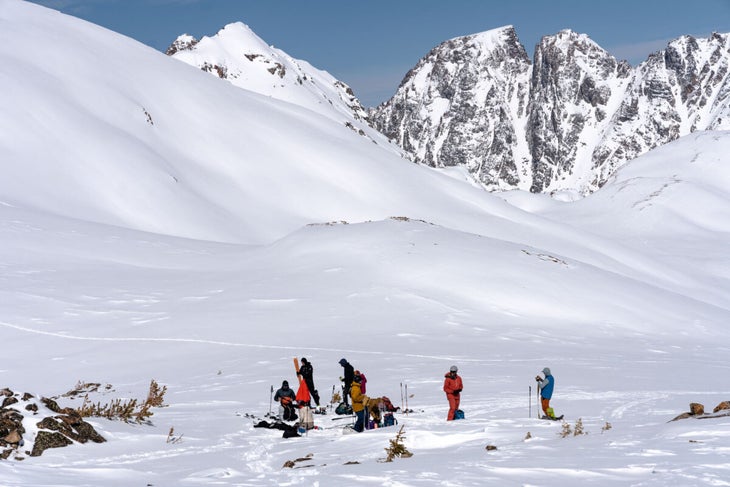
It was clear from the beginning that this was not a standard backcountry mission with solely physical objectives. This was not going to be an effort to log maximum vert or tag specific rad lines. Given the range of backcountry experience and abilities, with first-timers on one end of the spectrum and seasoned skiers and riders on the other, the MO here was just to move through the landscape at a shared pace, a pace that under ordinary circumstances might not be optimal for people at either end of the spectrum. To support each other. And to keep a light touch on our personal emotional objectives along the way.
Our guides to the external landscape were Ben Zavora and Logan DeMarcus of Beartooth Powder Guides, both lushly mustachioed men-o’-the-mountains who were also remarkably patient and sensitive to the unique objectives of a group like this. (“I may look like a portrait of toxic masculinity,” said Logan, softly, like a nice young man helping an elderly widow across a busy street.) They gave us a rundown of what they estimated to be a generally stable snowpack, unique to the Beartooths at this point in an unpredictable season. With the weather warming quickly there was even the likelihood of an incipient corn cycle over the coming days.
I talked Zavora into letting me tag along for the snowmobile shuttle out to the edge of the Absaroka-Beartooth Wilderness. Despite the powerful spring sunshine, the air was cold. Wisps of spindrift unfurled from the high ridges. The meadows were coated with two or three inches of new, wind-sifted snow. The skiing, for the others, was going to be excellent. At the Wilderness boundary, we parked the sleds and ran through an avalanche search exercise. We all managed to recover the beacons in fair time—even Graves, with her borrowed gear. Then the group set off in single file out into the Goose Lake cirque on skis and splitboards, with me following behind on snowshoes, one delicate step after another.
I didn’t make it far. I crested a barely-perceptible hillock at the edge of the basin and dug myself a shallow snow pit for protection against the northerly breeze. While the rest of the group skinned up the slope in the distance, chatting and laughing, I settled into the sunshine with my little thermos of tea, a sandwich, my notebook, and my old tattered copy of Edward Hoagland’s “Notes from the Century Before.”
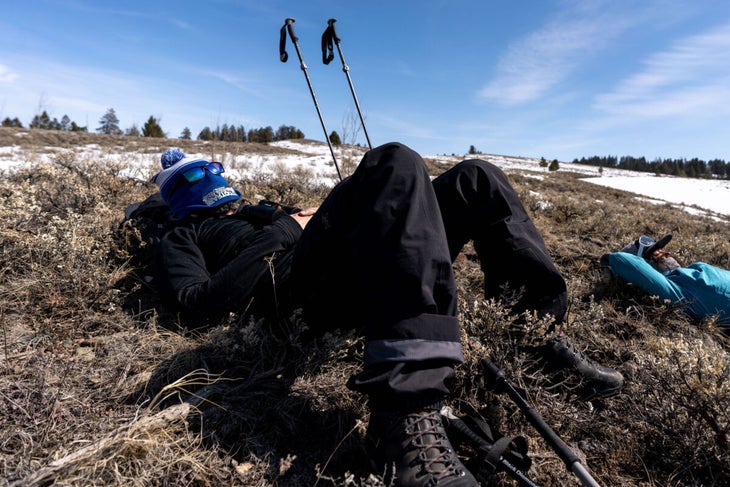
I couldn’t remember the last time I’d had the opportunity to sit for hours in one place, alone, with nothing to do but read and write and think. Surrounded by a dreamscape of snow and peaks and blue sky, with no cell reception. Nowhere else to be. Or more accurately, the last time I’d actually embraced such an opportunity without squirming or complaining or just inventing an excuse to move on. Perhaps never.
The soundlessness of the place was awesome—in the traditional sense of provoking awe and wonder—with only the occasional spasmodic scream of a two-stroke engine breaking the silence far away in the distance. At some point, I heard a human whoop, swallowed immediately by the muffled abstraction of the landscape. I peeked up out of my half-cave and watched as, one by one, my new friends came down the slope, each painting a line according to his or her instincts and abilities, one carving tidy little scallops, another long, swooping question marks. I couldn’t tell from that distance who was who, but I recognized Graves’ voice as clear as if she were standing right next to me: “That was awe-some!” When everyone completed the run, they set off up the skintrack for another lap.
That night after dinner we gathered in Rassekh’s room to share perspectives from the day. Graves had struggled with the kick turns, and the borrowed boots hurt her feet, but she’d been able to let that go and to settle into the backcountry groove. The money manager from Omaha was a new convert to the time-space of the uphill skintrack. “I could do that all day,” he said.
Everyone seemed blissfully present and aware, grateful even—or maybe especially—for the little aches and pains and general body-fatigue produced by a long day in the sun and the snow. Rather than dwelling on individual challenges and traumas, the focus of discussion was on the elemental lessons that might be learned from this kind of pared-down, uncomplicated now. Individually, everyone seemed to be working on a version of allowing his or herself to be enough, just as he or she was, working to ease the driving pressure of self-imposed expectations. Thanks to the tone set by Bare and Rassekh, the group served to provide radical and authentic support for everyone’s individual internal work.
“Even though our circumstances are different,” said the freeskier from Jackson, “the group container allows us to see how our minds are the same.”
The next morning we were joined at breakfast by Jesse Logan, one of the world’s foremost experts in whitebark pine ecology. He happened to live in a cabin right up the street. At 76, he was still sneaking around the mountains most days on backcountry skis like a wizened forest elf (as Bare described him).
Whitebarks are an ancient species of pine found in high-elevation landscapes across western North America. They’re a keystone species, foundational for the entire ecosystem, and the most important food source for grizzlies in the Greater Yellowstone. Some of the best skiing in the world is among whitebarks. “I don’t know if I love whitebarks because of where they are, or I love where they are because there are whitebarks,” said Logan.
Unfortunately, they are now in full collapse.
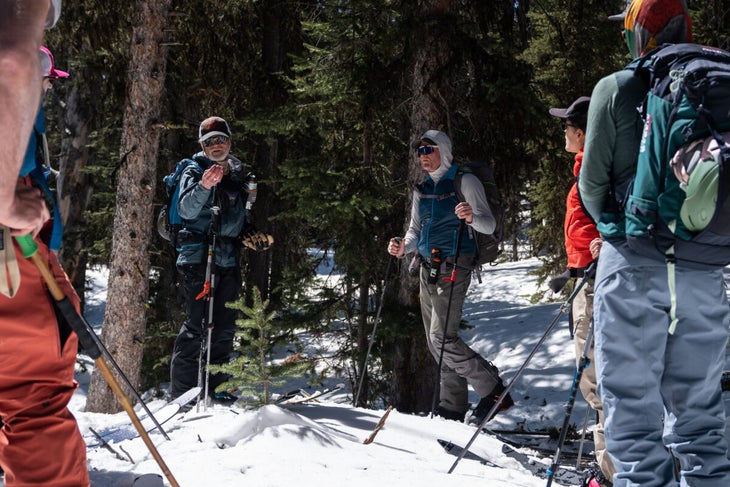
“For 30 years, the scientific consensus has been that climate change is real and it’s gonna kick our asses,” Logan said. And sure enough, after too many millennia for our little brains to fathom, the balance has now suddenly fallen apart. Whole forests have blinked out in the last decade, with more than 80 percent of all whitebarks succumbing to pine beetle, blister rust, and/or wildfire. The grizzlies, for the time being, seem to be hanging on, at least within the confines of the national park where they can’t be shot. But the genetic viability of the population remains very much in question.
In December 2020, after a long and tedious stretch of coalition building and campaigning—“after 15 years of struggle and wasted time,” said Logan, his voice cracking with emotion—the United States Fish and Wildlife Service finally proposed to list the whitebark pine as threatened under the Endangered Species Act. A few months later, on the same day I was lounging in a snow pit in the Absaroka-Beartooth Wilderness watching other people ski powder, that same federal agency resisted significant political pressure from Wyoming, Montana, and Idaho, including from some of Cooke City’s most prominent citizens, and officially declined to remove the grizzly from the endangered species list.
These little bureaucratic victories were not likely to save the forests or the bears from what they face. It all seemed catastrophic and hopeless to me. But Logan, for his part, was amazingly, inspiringly, philosophical. “The little wins matter,” he said. Even if for him it was time to step away, to leave the uphill battle to a talented and capable next generation, as he put it, to put his prodigious focus instead into fly fishing and backcountry skiing.
The group spent the rest of the day following Zavora and Logan up a skintrack straight from town into one of the last remaining healthy whitebark forests in the northern Rockies. It had been spared from beetle kill, miraculously, by a lucky cold snap in 2009. Meanwhile, I borrowed Rassekh’s van, Zavora’s snowshoes, and a can of bear spray from Logan, packed a lunch, and drove down into the park hoping to limp my way into another dose of awe.
Hours later, I was sitting on a lichen-encrusted boulder several miles out an unplowed road along the edge of a closed bear-management area. I saw days-old grizzly tracks on the way out. A pair of bison grazed just downslope, watching me one-eyed out of the side of their enormous skulls.
I wondered, doubted, if bear spray would have any effect whatsoever if one of them were to decide, just for the hell of it, to charge across the sagebrush at me. An osprey wheeled overhead. Scanning the plateau through prescription sunglasses, I saw a bull elk in the distance. Then another. Then, trotting below a gentle ridgeline above a stand of aspens, maybe a mile away, something clearly dog-like. A wolf? I pulled off my shades, fumbled binoculars to my eyes, and there he was—or she—looking right at me. A wolf. And then it was gone.
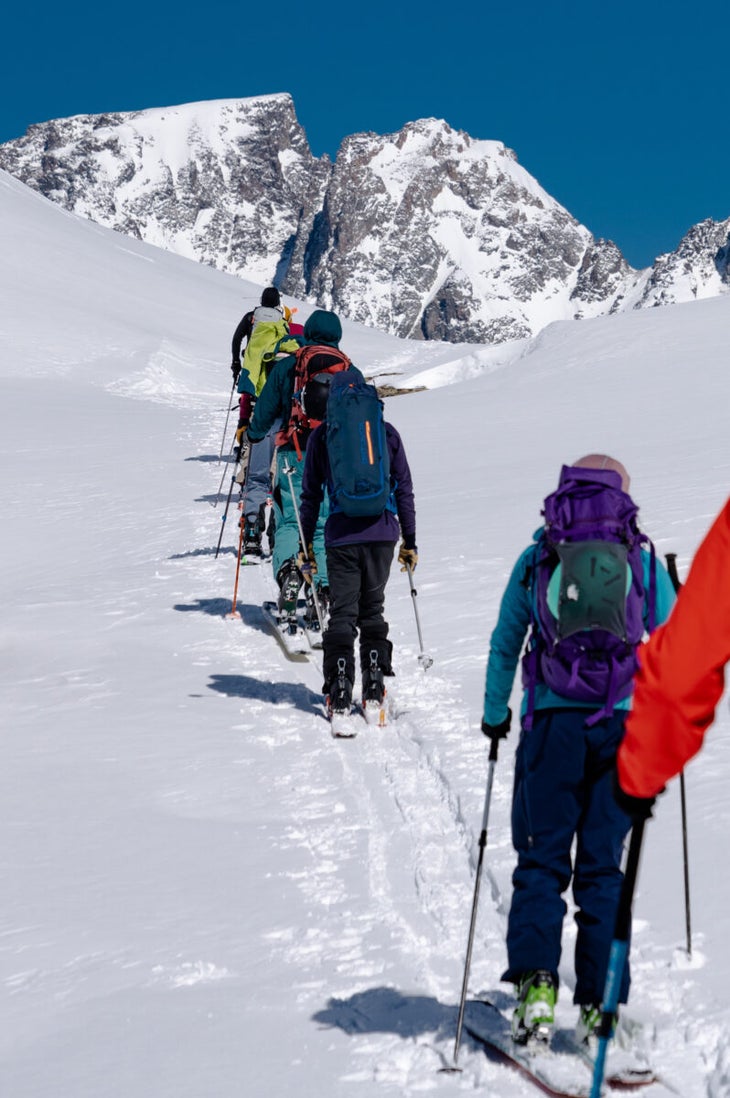
I wanted to sit right there in the vast silence until darkness fell. I had snacks and hot tea and a headlamp. I imagined a big old sow grizz cruising across the hillside in the last rays of the setting sun. And then I remembered how long it was going to take me to get back down to the van, limping along on snowshoes over crusty, uneven snow. Plus the hour’s drive back up to Cooke City. I remembered how everyone had left their street shoes in Rassekh’s van for when they got back from skiing at the end of the day. I should get back, I thought. And then I corrected myself—avoid the word ‘should,’ Bare had commanded.
I want to get back and get everybody their shoes, I said, out loud, into the still, sage-scented air. And in fact I did want to. So I stuffed the binoculars into my pack, strapped the loathsome snowshoes back onto my feet and hauled myself off the rock.
3. Integration
As with most expeditions away from everyday existence, even before the trip was over there was that familiar dread that seeps in toward the culmination of a happy interstice. Out here in this untethered space, amidst the big sky and vulnerability of strangers, I could see it all clearly. But how to carry that feeling back into everyday life?
“What do you want to take away from this experience?” Bare challenged the group.
“After the ecstasy, the laundry,” added Rassekh.
For Graves the experience was transformational. “We were so in the present,” she would say to me later. “Being in nature allows for that.” She found a new level of awareness. She learned how to recognize when she was letting her external circumstances—her successes or challenges or losses—determine how she was feeling, and then how to swing it the other way. “I realized, Oh wow, no matter what we do we are worthy. Whatever it is, this is something I can handle. It doesn’t mean anything about who I am.”
On the last full day, much of the group opted to skip the next steep skintrack and the fast-warming, increasingly variable snow. Logan’s knee was acting up. Others felt physically depleted and emotionally exhausted. So we piled into Rassekh’s van and followed Zavora’s truck back into the park for an easy nature walk.
Along the way, Logan told stories about the ancient Fremont people walking through this landscape 14,000 years ago, and about the Nez Perce and the early white trappers. He talked about the successful reintroduction of wolves in the late 1990s. He pointed out thickets of willow and aspen. The wolves had brought down the population of elk to sustainable levels, allowing the vegetation to come back along the streams and gullies in the park, helping to improve water quality and fish habitat.
I could feel the equanimity and ease of the present, the irrelevance of the future. I recognized the need—nay, the desire—to let my son live his own life without the burden of my own expectations and disappointments. If later he wanted to come back to skiing, or to some other means of bringing all things to the radness of the present, it would be there for him. The whitebarks and the wolves and the grizzlies would go the way they would, with or without my input.
“You will find yourself in a place where you’re going to have the old experience,” Rassekh would say many weeks later, during our final integration session on Zoom, when my leg was healed enough to ride my bike. “The opportunity then is to notice, to recognize which part of you is present. And to respond. Maybe it’s time for another adventure—even just in your backyard.”
Moving forward, I set a new intention to remember that I would always have more to learn from my son than he would from me. And when the world seemed doomed or I otherwise lost track of the goodness of my fellow humans, even if I couldn’t escape onto my skis, I would always be able to access the ringing blue stillness of that powder-filled cirque high in the Beartooths.
More Ski �����ԹϺ��� Stories


